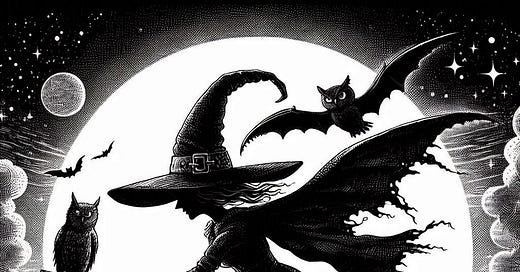Magic word of the day: Weird
It started with a few scary, powerful, and possibly immortal women.
The relatively obscure governor of Minnesota, Tim Walz, launched himself into the final round of Democratic VP candidates with just one word. Having gotten some buzz by using it in an MSNBC interview, he repeated it on CNN Sunday and kept on using it like an amateur comedian who discovered his killer joke.
What made the word stick? To understand, we must dive into the dark art of rhetoric, and the even darker art of witchcraft. Our vehicle will be our language’s initium novum, the Oxford English Dictionary
According to the OED, “weird” first cropped up in old English around the twelfth century, when it referred to the Fates, commonly known as the “weird sisters.” These three scary ancient goddesses determined every mortal’s destiny. Over a couple of centuries, the adjective came to connote anything supernatural—especially a suspect woman. The “weird sisters” became the three witches in Shakespeare’s MacBeth.
The spelling that the Bard used, though, shows that he conflated “weird” with “wayward.” He used “weyward Sisters” in one line and “weyard Women” two acts later. Was he making a pun?
The scholar Garry Wills seems to think so. He asserts that MacBeth is an anti-Catholic play, a reaction to the 1605 attempt by a group of English Catholics to blow up the House of Lords during the opening of Parliament. Shakespeare wrote MacBeth a year or two later. In conflating “weird” and “wayward,” he pushed the witches—and, Wills argues, Catholics in general—beyond the pale. Weirdos. Outsiders. Black-magicky folk. Illegals.
Back to Tim Walz. He told Jake Tapper (a former intern of mine at Dartmouth, ahem) that calling Donald Trump and JD Vance “weird” lets us “ratchet down the scariness.” The Dems had been portraying these men as powerful threats to democracy. Walz weirded the conversation to belittle the candidates, shrink them down, cartoonize them.
But whether he intended to or not, Walz was tapping into a sub-realm of cultural consciousness. Etymologies constitute language’s repressed memories. Original meanings stick to the back corners of our collective synapses and apply shading to our words’ connotations. Weird means something different than odd (“distinct; irregular”). It emerged from terrible goddesses and Catholic witches and, apparently, from a historical streak of male insecurity. However unintentionally, when Walz called “these guys” “weird,” he was pushing them into a particularly scary sort of Other. Maybe even a slightly emasculated Other.
Up until Walz’s “weird” virality, it was the Democrats who suffered from emasculating mean words. (Donald Trump Jr. seems, um, weirdly obsessed with the word “cuck,” meaning cuckold.) The political left is the realm of pronouns and non-normies and LGBTQ+ jargon. Progressives are queer (“strange, odd, peculiar, eccentric,” also “of questionable character; suspicious, dubious”). Beginning in the early 1800s, “queer” became a derogatory term to mean a homosexual person. Which, in a turnabout worthy of “Yankee,” gays made a term of pride.
Other isn’t always bad. But weird? You don’t want to be weird, sister. As Lord Macduff says in the Scottish play, weirdos are “clamorous harbingers of blood and death.”
Some ratchet, Governor.





Point in outrage = anger. Point and laugh = dismissal.
Mockery is more powerful than frustrated anger.